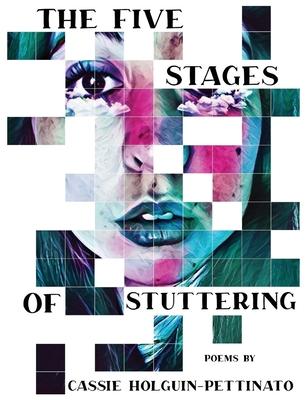The Five Stages of Stuttering is a poetic exploration of the connection between stuttering and grief. Stuttering is a fluency disorder. It is an interruption of the flow of speaking. A verbal paralysis. "I had to start where-where-where I left off," Cassie Holguin-Pettinato writes. The emotional pain of her words is exacerbated with every repetition. Her poems about family estrangement, chronic pain, divorce, postpartum depression, and unspoken traumas are interrupted with blockages and interjections. What if poetry itself is a form of disfluency commonly referred to as stuttering? "I couldn't speak the language of my mother. And so I hid the sacred clown in me." Stuttering is a form of disconnection from the original tongue. Snippets of a foreign language become bullets in times of war. Holguin-Pettinato's poetry is deeply rooted in place yet simultaneously estranged from it. "There is no grave to visit the living/Here." The poet needs to go through all the stages of grief-denial, anger, bargaining, depression, and acceptance-before she can finally begin to find her voice. "I want [ ] peace," Cassie Holguin-Pettinato writes. "Sadness is on me for a little while." The final stage of grief and stuttering is acceptance and revision. And then the poetry begins.

The Five Stages of Stuttering is a poetic exploration of the connection between stuttering and grief. Stuttering is a fluency disorder. It is an interruption of the flow of speaking. A verbal paralysis. "I had to start where-where-where I left off," Cassie Holguin-Pettinato writes. The emotional pain of her words is exacerbated with every repetition. Her poems about family estrangement, chronic pain, divorce, postpartum depression, and unspoken traumas are interrupted with blockages and interjections. What if poetry itself is a form of disfluency commonly referred to as stuttering? "I couldn't speak the language of my mother. And so I hid the sacred clown in me." Stuttering is a form of disconnection from the original tongue. Snippets of a foreign language become bullets in times of war. Holguin-Pettinato's poetry is deeply rooted in place yet simultaneously estranged from it. "There is no grave to visit the living/Here." The poet needs to go through all the stages of grief-denial, anger, bargaining, depression, and acceptance-before she can finally begin to find her voice. "I want [ ] peace," Cassie Holguin-Pettinato writes. "Sadness is on me for a little while." The final stage of grief and stuttering is acceptance and revision. And then the poetry begins.